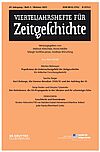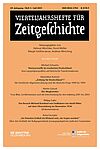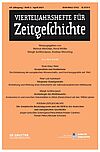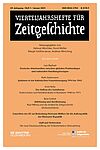- The Institute
- Research
- Dictatorships in the 20th Century
- Democracies and their Historical Self-Perceptions
- Transformations in Most Recent History
- International and Transnational Relations
- Edited Source Collections
- Dissertation Projects
- Completed Projects
- Dokumentation Obersalzberg
- Center for Holocaust Studies
- Berlin Center for Cold War Studies
- Publications
- Vierteljahrshefte
- The Archives
- Library
- Center for Holocaust Studies
- News
- Dates
- Press
- Recent Publications
- News from the Institute
- Topics
- Feature film under National Socialism
- The history of the Federal Ministry of Finance (1945-1990)
- Reordering Yugoslavia, Rethinking Europe
- Munich 1972
- Confronting Decline
- Digital Contemporary History
- Transportation in Germany
- German Federal Chancellery
- Democratic Culture and the Nazi Past
- The History of the Treuhandanstalt
- Foreign Policy Documentation (AAPD)
- Dokumentation Obersalzberg
- Hitler, Mein Kampf. A Critical Edition
- "Man hört, man spricht"

Issue October 2021
Populism as a Field of Study of Contemporary History. A Critical Research Report. | Kurt Daluege, the Stennes Revolts 1930/31 and the Rise of the SS. | The Holodomor, Nazi Propaganda in Ukraine and its Difficult Legacy. | Gender and Democracy. Interpretative Struggles about the Social Order in the Federal Republic of Germany.

Issue July 2021
Homosexuals in Modern Germany. A Long-Term Perspective on Historical Transformations. | A “Newspaper for Germany”? The Frankfurter Allgemeine Zeitung and the German Question, 1969 to 1990. | The Trailblazers. Tony Blair, Great Britain and the Decision to Go to War in Iraq, 2001 to 2003. | Contradictions of a Modus Vivendi. Documents on the Visit of Michael Cardinal von Faulhaber with Adolf Hitler on the Obersalzberg in November 1936. | “To Be a Treasure in a Foreign Continent, To Become a Blessing”. About the Whereabouts of Cult Objects of (Forcibly) Dissolved Jewish Communities.

Issue April 2021
Cooperation and Competition. The Emergence of European Science and Research Policies Since 1945. | The Flying Court Martial. Genesis and Effect of an Instrument of National Socialist Military Justice. | The Archaeology of Competition. Competition Within and Between Universities in (West-) Germany Since the 1980s. | More than a Footnote! The Soviet Zone of Occupation and the GDR in German and European History.

Issue January 2021
German Working Environments Between Global Challenges and National Reactions. Perspectives of Contemporary Historiography. | Emancipatory Awakening and Antisemitic Persecution. Jewish Women in the Italian Women’s Movement, 1914 to 1945. | Building the Socialism. The Schools of Cadres and the Party Bureaucracy in Romania ‒ Regional Party School of Timișoara, 1948 to 1973. | Rejection and Recognition. Raul Hilberg and the Institute for Contemporary History. | A Social Democrat in the Foreign Office. Expertise of the Leibniz-Institute for Contemporary History on the Significance of Hermann Müller for the Foreign Policy of the Weimar Republic. | Idyll and crimes. The new permanent exhibition of the Obersalzberg documentation.






